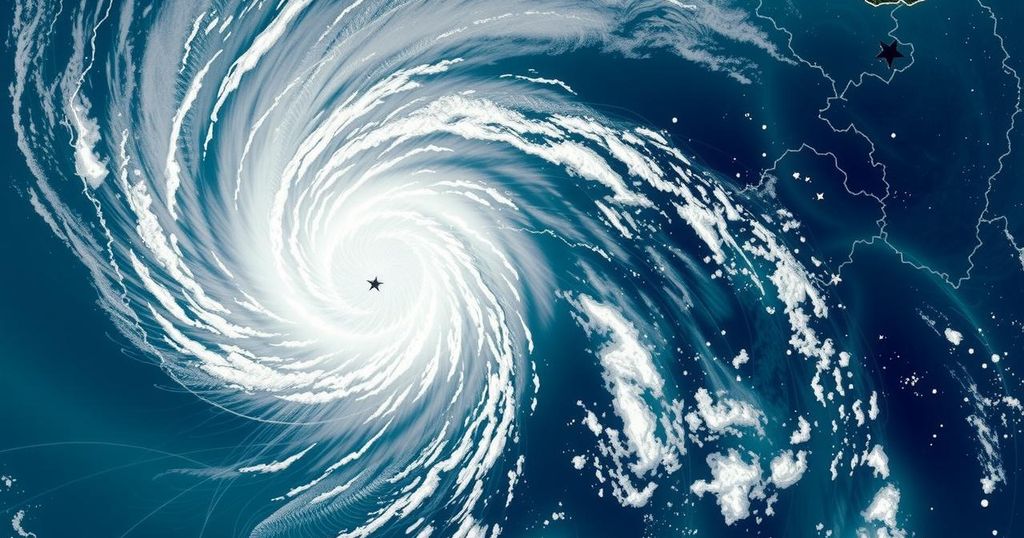Impact of Tropical Cyclone Chido on Communities in the Southwest Indian Ocean
Tropical Cyclone Chido has caused widespread devastation in the Southwest Indian Ocean, leading to at least 142 deaths and injuring over 3,300 individuals. Madagascar, Mozambique, Mayotte, and Malawi are among the hardest-hit areas, with significant infrastructural damage and substantial agricultural losses reported. Efforts for humanitarian aid and disaster management are ongoing as the full extent of the damage is assessed, emphasizing the critical need for preparedness in facing future cyclones.
Tropical Cyclone Chido has emerged as a significant and destructive force in the Southwest Indian Ocean, marking an alarming start to a cyclone season that was predicted to be early and above-average, particularly affecting the Mascarene Islands, Madagascar, and Mozambique. On December 11, Chido intensified into a Category 4 cyclone, recording sustained winds of 220 km/h and gusts up to 250 km/h, which resulted in a catastrophic impact across the region. Reports indicate that, as of December 22, the cyclone has led to at least 142 confirmed fatalities and more than 3,300 injuries. Madagascar was the first to feel Chido’s wrath, with approximately 135,838 individuals affected in its northern Diana Region, where the cyclone caused severe infrastructural damage and significant crop losses amid flooding triggered by heavy rainfall.
In response, the Malagasy authorities and the Red Cross initiated preventive measures, including evacuations in high-risk areas. Following the cyclone’s passage on December 14, the Comoros government observed a week of mourning, with reports detailing the cyclone’s impact on 64,167 residents in Anjouan and Moheli. The cyclone damaged schools and homes, while agricultural losses affected nearly half of the crops. Meanwhile, in Mayotte, about 70 percent of the population, approximately 230,000 individuals, experienced serious repercussions, with 35,000 homes destroyed and critical infrastructure, including hospitals and airports, damaged, thereby hindering essential services. Approximately 100,000 people found temporary shelter in various centers lacking basic necessities such as water, food, and hygiene facilities.
In Mozambique, the cyclone affected around 622,000 individuals, primarily in Cabo Delgado, where 509,800 have suffered severe damage to their homes and essential infrastructure. The cyclone caused extensive damage to over 130,000 shelters and devastated livelihoods, exacerbating vulnerabilities in the region. Furthermore, nearly 45,000 people in Malawi faced difficulties due to the aftermath of the cyclone, underscoring the necessity for ongoing disaster management and humanitarian aid.
As assessments continue, it remains crucial to determine the full extent of the damage to infrastructure and agriculture. The National Societies of the Red Cross and Red Crescent are actively engaged in humanitarian efforts, including search and rescue operations and family reunifications. The impact of Cyclone Chido highlights the pressing need for preparedness, resilience, and the capacity to respond to increasingly intense tropical storms. The current Emergency Appeal aims to mobilize resources to facilitate humanitarian assistance and enhance the preparedness of National Societies and their volunteers while bolstering the resilience of at-risk communities throughout the ongoing cyclone season.
The Southwest Indian Ocean faces significant risks from tropical cyclones, particularly during the cyclone season, which is predicted to be more severe this year. Tropical Cyclone Chido has emerged as a notable example of such a storm, causing catastrophic impacts on several nations, including Madagascar, Mozambique, and the Comoros Islands. These areas are prone to natural disasters affecting a large number of people and disrupting essential services, agriculture, and infrastructure. Understanding the context of these cyclones, including responses from local authorities and humanitarian organizations, is crucial for addressing the challenges faced by affected communities and planning for future disaster preparedness and response.
The devastation brought by Tropical Cyclone Chido serves as a stark reminder of the vulnerabilities faced by communities in the Southwest Indian Ocean during cyclone season. With significant fatalities, widespread injuries, and extensive damage reported across multiple nations, there is an urgent need for ongoing humanitarian aid and disaster management initiatives. The appeal for resources to support recovery efforts and enhance preparedness is critical for safeguarding the well-being of the affected populations and reinforcing resilience against future cyclones, highlighting the importance of international cooperation and local engagement in tackling such natural disasters.
Original Source: reliefweb.int




Post Comment